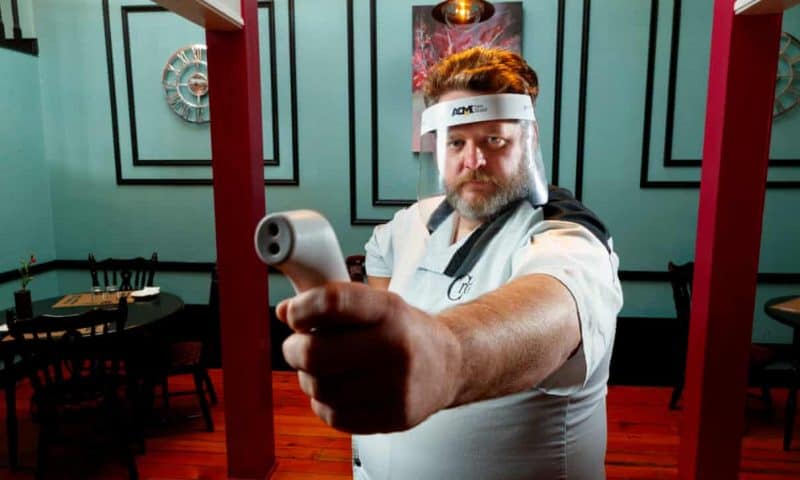Hotels and restaurants are turning away US guests, citing high Covid-19 rates and lax quarantine. Some fear this will backfire
Ireland has long greeted American tourists with open arms and the Irish salutation céad míle fáilte, literally, “a hundred thousand welcomes”.
An especially warm welcome awaits visitors who are big spenders and descendants of the diaspora.
But that was before Covid-19 turned everything upside down and Americans became objects of suspicion – unwanted interlopers from a country which last week surpassed four million cases.
Some restaurants and hotels have started turning away US visitors in case they infect staff and other customers with coronavirus, a concern fuelled by surging infection rates in some US states and Ireland’s lax quarantine enforcement.
“It’s never a good business model to turn away visitors but this isn’t about business,” said Noel Keane, a chef who recently barred two groups of Americans from Croí restaurant in Tralee, County Kerry. “From a moral point of view, it’s the right thing to do.”
The would-be diners admitted they had not self-isolated for 14 days after entering Ireland, compelling a rebuff, said Keane. “I said no. There was no malice. It’s certainly not an anti-American sentiment.”
Other businesses have followed suit, some openly, others discreetly.
JP McMahon, a chef and owner of Cava Bodega in Galway, started questioning tourists and turning away those that admitted violating quarantine after his staff felt “uncomfortable” serving a group from Texas.
The Kings Head pub in Galway and Gregan’s Castle Hotel in County Clare tweeted that they, too, had turned away Americans just off the plane.
The Charleville Lodge in Dublin said that it was banning American tourists – even those seeking to quarantine in the hotel: “The government has advised that overseas guests must ‘stay in your hotel or guesthouse’, which means the government is happy to put my staff at risk by being in contact with these guests. This is not self-isolation.”
Other establishments may be applying the same policy without advertising the fact.
Some Americans who phone hotels are told there is no availability, said Guy Serbin, who runs a Facebook group for US expatriates in Ireland. “Then, when their Irish spouse calls, there are rooms.”
Americans who live in Ireland were being lumped in with tourists, said Serbin, 48, an entrepreneur based in Dublin. “I could see myself running into that if I try to book a hotel.”
While the pandemic rages, Serbin is not keen on US visitors either. “I don’t think Americans should be travelling anywhere.”
Proper controls at the airport and quarantine enforcement could obviate cold shouldering, he said: “The government needs to enforce this at immigration.”
Ireland is one of the few EU states that still admits Americans. Aer Lingus runs daily flights to Dublin from Boston, Chicago and New York. American Airlines flies from Dallas. Some 200-250 people disembark daily, a trickle compared to last year.
A condition of entry for visitors from the US and most countries, including Britain, is to self-isolate for 14 days. However, enforcement is patchy, a potential Achilles heel in Ireland’s successful suppression of the virus. Just 7% of passengers are contacted after arriving in Ireland to check their location.
Anjuli Ponce, 28, a social worker from Pennsylvania who has lived in Ireland since 2019, said hotels and restaurants had a duty to protect staff and customers but she was uneasy at the focus on Americans. “Just because you have a certain accent, people assume you’ve just got off the plane. It does feel discriminatory.” Sensitivities appear sharpest in tourist spots outside Dublin, said Ponce.
She worries about an upcoming trip to Donegal: “I don’t want people to be uncomfortable and don’t want to be in any confrontation.”
But some say Ireland’s tourism industry risks alienating a vital market. “Here we are saying we want to get our industry up and running again but because you have a particular accent we won’t serve you,” said Tony McMahon, the owner of Bellissimo restaurant in Waterford. “If the correct measures are in place it’s not up to us to be judge and jury.”
Ireland will need US visitors after the pandemic, said Niall O’Callaghan, chairman of the Association of Visitor Experiences & Attractions. “We need to be very cognisant to not bite off the hand that feeds us.”
Pat Dawson, chief executive of the Irish Travel Agents Association, said Americans were noting the dwindling welcomes. “We have to be very careful about how we deliver that message. They fill many mouths with their dollars when they’re here.”

